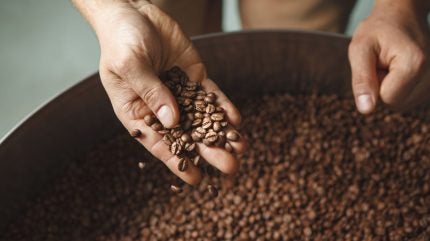
Coffee could become even more costly for consumers as the price of the commodity on global markets hit a record high.
The price of Arabica coffee beans, the most commonly consumed coffee variety, reached $3.34 per pound yesterday (10 December) on the Intercontinental Exchange (ICE).

Discover B2B Marketing That Performs
Combine business intelligence and editorial excellence to reach engaged professionals across 36 leading media platforms.
Robusta beans had also surged to an unprecedented level at the end of November to touch $5,565 per metric tonne, but have since retreated to trade at $5,268.
Coffee prices gained on the news that coffee trader Volcafe Ltd. had cut its production outlook for Arabica-producing Brazil due to the impact of a drought.
According to Bloomberg, the major trader expects Brazil to produce 34.4 million bags of premium Arabica next season, a drop of 11 million bags from estimates shared with the publication in September.
The decline, it reported, would see global coffee production likely miss the anticipated demand by 8.5 million bags in the 2025-26 season.

US Tariffs are shifting - will you react or anticipate?
Don’t let policy changes catch you off guard. Stay proactive with real-time data and expert analysis.
By GlobalDataResearch from GlobalData, Just Drinks’ parent company, estimates 2024-25 Brazil coffee production to drop by a million bags to 67 million bags, while the USDA lowered its estimation for Brazil’s 2024/25 crop by 3.5 million bags to 66.4 million bags. Consultancy StoneX, meanwhile, expects the crop next year to sit just under this year at 65.6 million bags.
Senior economist at GlobalData’s agriculture division, Aaron Hanson, told Just Drinks the recent hike in prices “is arguably driven by technical factors and speculation/fear”, rather than hard evidence on supply prospects.
“I think we are not yet quite as committed as [Volcafe] are to declaring a coffee catastrophe, but this comes against a backdrop of multi-decade low stocks in consumer countries, i.e. a very small buffer to protect consumers from running out of coffee – that naturally increases volatility, which is what we are seeing.”
According to a recent analysis report for coffee, GlobalData said “the prospects are decidedly less rosy for the ’25-26 Brazilian crop”, which could have a wider impact on coffee more broadly, given “Brazil was expected to compensate for lacklustre production in Vietnam”, the leading Robusta producer.
Depending on what happens with the Brazil 2025/26 crop, which begins in April, the commodity could be headed into “a fifth year of deficit”, said ING head of commodities strategy Warren Petterson in an analysis published today (11 December).
With the surge in prices, it’s looking more likely more coffee producers are going to have to offload the cost onto consumers.
Speaking to the BBC, Italian coffee producer Lavazza said it had taken great strides to not pass on price hikes to the consumer, but the soaring price of coffee had left them with no choice.
“Quality is paramount for us and has always been the cornerstone of our contract of trust with consumers,” the company told the BBC.
“For us, this means continuing to tackle very high costs. So, we have been forced to adjust prices.”
The CEO of Swiss food and drinks conglomerate Nestlé, Laurent Freixe, said in the company’s nine-month results in October that the company was working in “not the most supportive” environment, and that rising coffee prices was likely something “we will have to manage”.
In the summer, JDE Peet’s then-CEO Luc Vandevelde said it would be upping its full-year forecast as it looked to up product prices to combat “volatility” in green bean coffee prices.
JM Smucker also indicated plans in August to hike prices across its portfolio, by taking “a second list price increase across our portfolio in early October”.
Speaking on the latest hike in coffee prices, sustainable sourcing manager at Fairtrade, Max Milward, said the situation “highlights the volatility of the global coffee market and the challenges faced by farmers”.
He added: “Climate change combined with the increase in demand for coffee means that farmers need long-term solutions, or the supply chain faces significant risks leading to a continuation of volatile coffee prices.
“To address these challenges, it’s crucial to create systems that provide stability and support for farmers, enabling them to invest in their communities and build resilience against climate change. By promoting fair and equitable trade practices, the coffee industry can help ensure a sustainable future for both farmers and the wider supply chain.”





